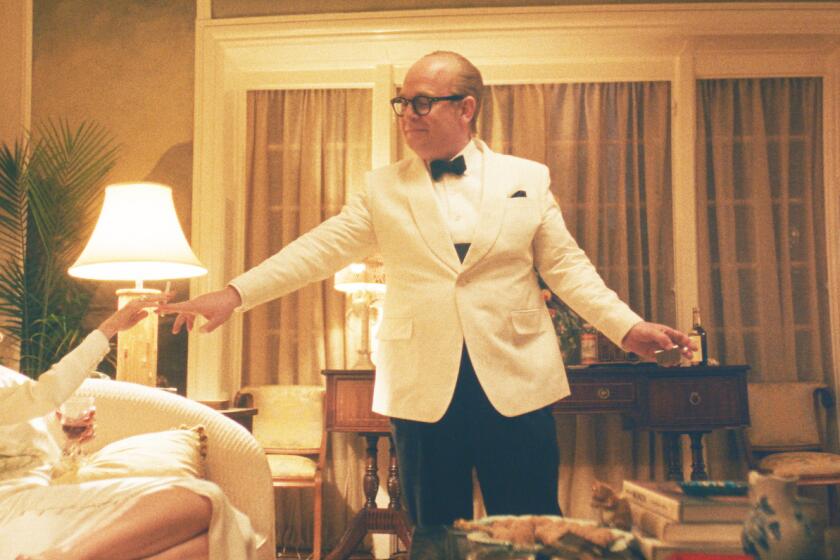As Joanne Carson in ‘Feud,’ Molly Ringwald strikes a California contrast with the Manhattan swans
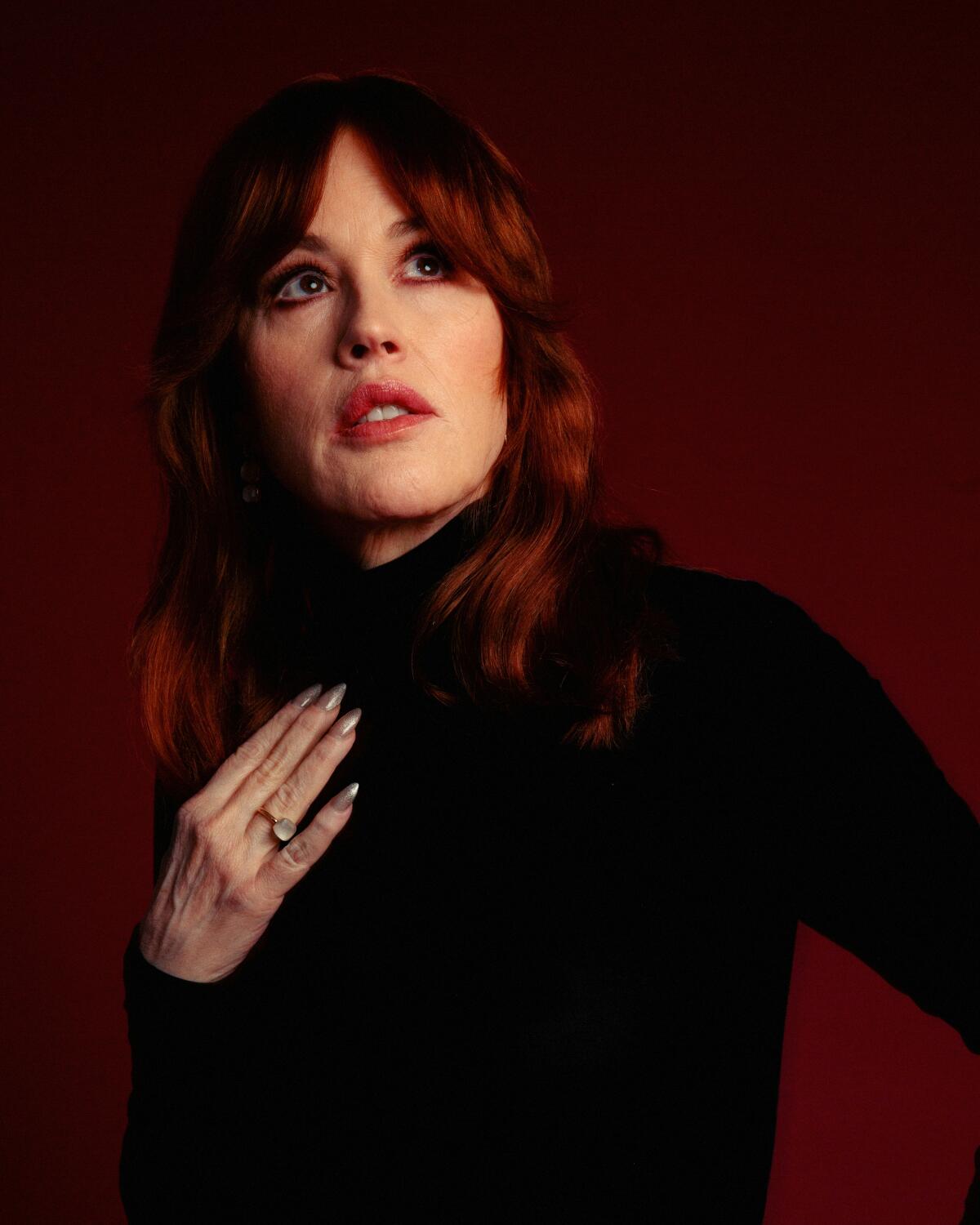
- Share via
NEW YORK — Molly Ringwald has a long-standing connection to Truman Capote: When she was about 3 years old, she appeared onstage in “The Grass Harp.” Her character was referred to as Fig Newton — although she doesn’t think that was in the script — and she didn’t have any lines.
Still, it sparked an awareness of the writer at an early age and his powerful mystique. “It was one of those things where I was always interested in Truman Capote because I’ve known about him for so long,” she says.
Five decades later, Ringwald has returned to where it all began in “Feud: Capote vs. the Swans,” a drama — loosely based on Laurence Leamer’s “Capote’s Women” — about the writer’s tangled, toxic relationships with a coterie of New York socialites he admiringly dubbed “the swans.” The women, led by Babe Paley (Naomi Watts), largely shunned Capote (Tom Hollander) after the publication of “La Côte Basque, 1965,” a barely fictionalized account of murder and infidelity among the Manhattan elite, in Esquire in 1975. The bitter falling-out hastened Capote’s descent into drug addiction and alcoholism, and it may explain why he struggled in vain to complete “Answered Prayers,” the long-gestating novel from which “La Côte Basque” was excerpted.
In FX’s “Feud: Capote vs. the Swans,” the second season of Ryan Murphy’s anthology series, Tom Hollander plays Truman Capote, and Naomi Watts, Diane Lane, Chloë Sevigny, Molly Ringwald, Calista Flockhart and Demi Moore the women who are in and out of his life.
“I was just fascinated by the swans story, both as a lover of Truman Capote’s writing, and then also just as a lover of fashion,” says the actor and writer, 56, perusing the menu at a swank Manhattan hotel — just around the corner from where La Côte Basque, the French restaurant that was a favorite gathering place for Capote and his swans, once stood. Her famous red hair pulled back loosely, with a face-framing fringe, Ringwald wears flowy black embroidered silk, looking more downtown bohemian than uptown doyenne.
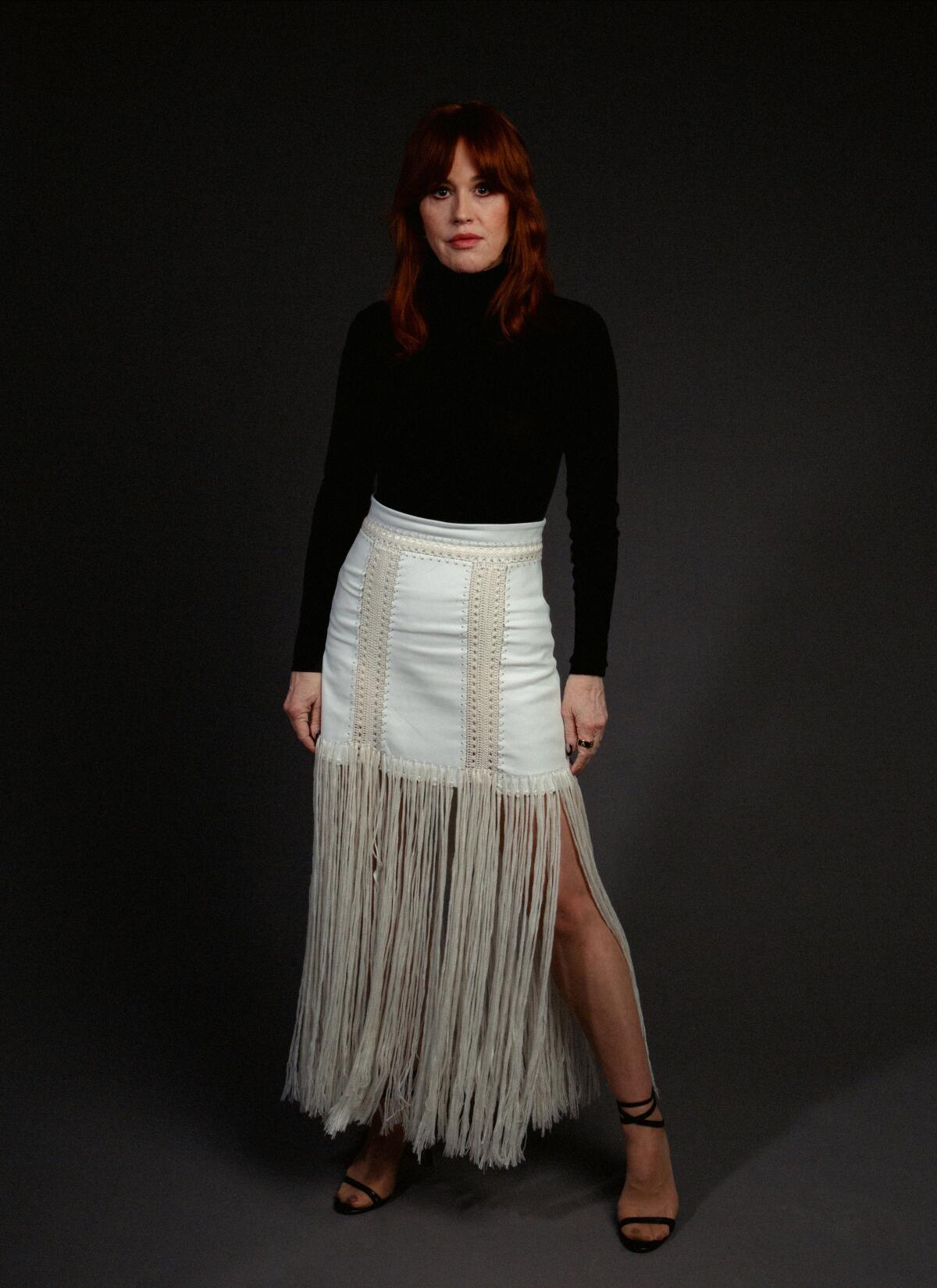
In the series, created by Ryan Murphy and written by Jon Robin Baitz, she stars as Joanne Carson, second wife of “Tonight Show” host Johnny Carson, who befriended Capote at the height of his literary stardom in the ’60s. She remained loyal to him to the bitter end — despite the fact “La Côte Basque” included embarrassing details about a woman named “Jane Baxter” whose doomed marriage to a philandering comedian clearly resembled her own. So devoted was Carson that she even gave Capote a writing room in her Bel-Air home, where he often stayed for months at a time — and where he died in 1984, in exile on the West Coast, having never published another book since his masterpiece, “In Cold Blood,” almost two decades earlier. The unlikely partnership endured posthumously: Carson received a portion of Capote’s ashes when he died, and they are interred next to each other at Westwood Cemetery. (She died in 2015.)
“She really, really thought that she was helping a genius create, and she had a lot of respect for his writing,” Ringwald says of Carson and her relationship with Capote. “They were outcasts at the same time because Joanne had divorced Johnny; she was no longer in the Hollywood elite, and he was shunned by all the swans.”
“Capote vs. the Swans” is cleverly cast with women who might be fairly described as It Girls from bygone eras who know a thing or two about the perils of celebrity, including ’90s indie darling Chloë Sevigny, Ringwald and fellow Brat Packer Demi Moore (though the two had previously never worked together or even knew each other well). Ringwald remains an icon of ’80s adolescence, a relatable teenage everywoman known for her work with John Hughes in “The Breakfast Club,” “Pretty in Pink” and “Sixteen Candles” — films that were so ubiquitous that they are embedded in Gen X’s collective consciousness.
Ringwald’s Carson also strikes a kooky, California contrast with the Manhattan swans — both more humble and more out-there than the East Coast grand dames like Lee Radziwill (Calista Flockhart) and Slim Keith (Diane Lane). She gets colonics, works out with Richard Simmons and, much to Capote’s chagrin, “buys paper lamps from Pier One.”
Baitz was struck by the portrait of Carson that emerged from Leamer’s book, that “of a hapless lady running around with an urn of ashes” and hosting dinner parties with bleak culinary options. In a memorable sequence from Episode 2, Carson thanks “Mother Earth and Father Sky” while saying Thanksgiving grace as her guests, including Capote and Phyllis Diller, warily eye a buffet that features canned beets and some sort of marshmallow dish. (Back in New York, the other swans gather at the sound of a gong to eat turkey carved by waiters in tuxedos.)
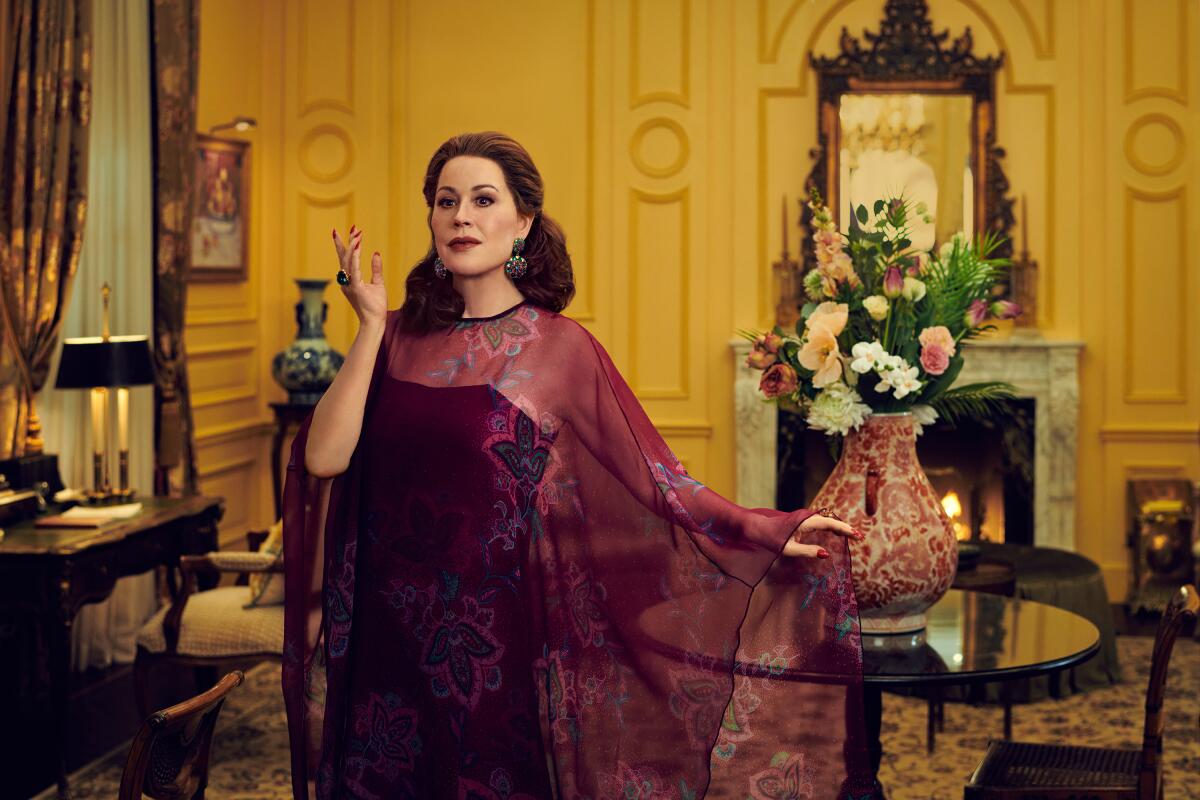
Capote had long-standing ties to California, including a home in Palm Springs. As his writing career faltered, he leaned on his Hollywood celebrity, hitting up the talk show circuit and starring as an eccentric billionaire in the cult classic “Murder By Death’’ (which Baitz deems “a sweaty melange of absolutely catastrophic acting”). But he was unmoored from the people and place where he’d made a name for himself: New York.
Baitz suspects that Capote, a Southerner turned New York elitist, would probably have been disappointed to die in California, though he might have laughed about it, too. (“Let’s face it, once you’ve done “Murder by Death,” he says, “everything else is a joke after that.”)
“My guess is that he mostly had contempt for everything but the highest echelon of New York culture, and that California was simply a place where Joanne Carson and the Beverly Hills Hotel were, and they bought his stuff for the movies,” says Baitz.
Carson and Capote were, in his view, “two lost children.” “They’re these two people who miss their centers, clinging together. I find that deeply poignant because most of their hearts are elsewhere. What little they have left, they give to each other.” Carson’s generosity and kindness “were a distraction from how much she missed Johnny,” Baitz contends.
The real Carson, who worked as a model and talk show host, moved to California from New York after her marriage fell apart. (As she told The Times in 2006, he got most of their friends in the split: “Everyone moved toward Johnny, because that was where the power was. But Truman stood by me like a rock.”)
Auction shows the bond between Carson’s ex and the exiled Capote.
Ringwald, who was born and raised in California, followed a different trajectory: that of the West Coast girl who found herself by moving east — way, way east. In the early ’90s, Ringwald relocated to Paris for several years, turning down Hollywood offers to star in French-language films and immerse herself in a culture she’d long had an affinity for.
“I wasn’t really getting the roles that I wanted, or that were speaking to me, but I think I was also just kind of burnt out because I’d been working for so long,” she says of this period. Ringwald was away for “a lot of formative Hollywood years,” but “wasn’t really thinking about the fact that you’re considered geriatric as soon as you’re, like, 22.” But she points to her time abroad as one of the main reasons that, as a wildly successful child actor who managed to forge an adult career without going off the rails in the process, she is an outlier among her peers.
“I’ve always wanted to educate myself and put myself in situations where I’m learning things. I feel like that makes you more interesting as a person and more interesting people, I think, are generally more interesting actors.” She later settled in New York and now lives outside the city, where she enjoys device-free dinners with her husband and three kids. “When you grow up in the business, there’s just a lot of baggage [to L.A.]. I wanted to live somewhere where I felt like I could be friends with people who weren’t just in show business,” she says.
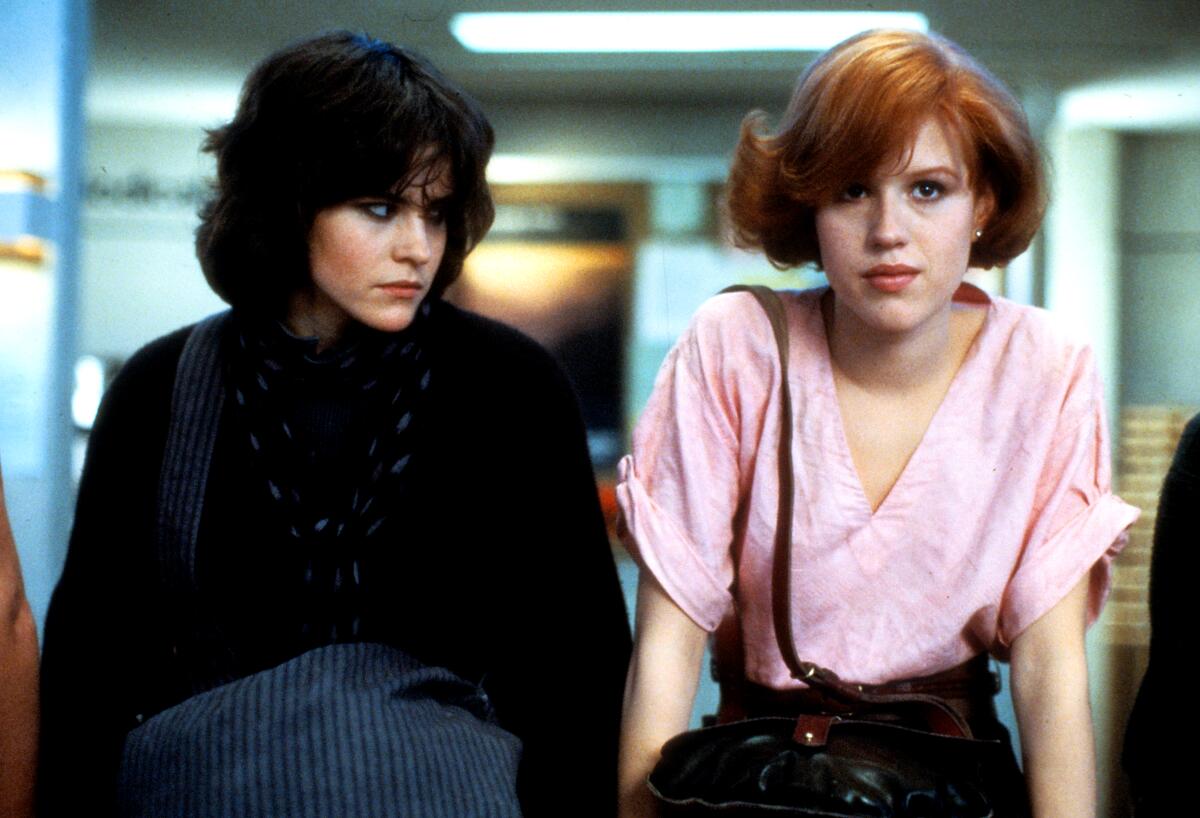
While acting steadily for most of the last two decades, with recurring roles on “The Secret Life of the American Teenager” and “Riverdale,” Ringwald has also forged a second career as a writer and translator. She published the memoir “Getting the Pretty Back: Friendship, Family and Finding the Perfect Lipstick” and the novel “When It Happens to You: A Novel In Stories.” In a piece for the New Yorker in 2018, she reflected on the complicated legacy of the films she made with Hughes and how she perceived them in the wake of #MeToo.
She recently showed her 14-year-old twins “The Breakfast Club” for the first time, and she was heartened by their reaction to it. “They didn’t understand why I would allow myself to be sexually harassed and verbally abused by a guy and then kiss him. And I was like, ‘Yeah, welcome to the way that I grew up.’ That doesn’t really fly for my kids today.” Still, they enjoyed it, she says: “Put it this way, they watched the whole thing without picking up their phones, which is huge.”
Ringwald was also reluctant to allow her daughter, Mathilda Gianopoulos, now 20, to pursue acting professionally as a child — “which was a big bone of contention,” she says. “I said, you will learn how to act, I will support you learning how to do this. I just won’t let you do it as a paid actor at a young age, and it drove her crazy. But she’s really good.” (She has a part in the upcoming film “The Idea of You,” with Anne Hathaway.)
Ringwald first worked with Murphy in “Dahmer — Monster: The Jeffrey Dahmer Story,” playing the killer’s stepmother Shari, and she admires his willingness to “put his money where his mouth is” when it comes to casting and cultivating interesting material for women over 40.
“He sees that talent doesn’t go away and gives you an opportunity when other people don’t,” she says. “I’m a devotee. I’ll do anything he asks me to do. I’ll read the phone book.”
Murphy suggested her for the role of Carson — an idea that Baitz says left him “strangely starstruck.” He first recalls seeing Ringwald opposite Gena Rowlands and John Cassavetes in the Paul Mazursky film “Tempest” and later became a fan of her writing and translations.
“She was kind of a chimera, rather than a knowable quantity — intellectual, bright and a little bit mysterious in some way that I can’t quite articulate,” he says. “Like many writers, she has a self-contained, internalized quality, where you sense that there’s a great deal going on, under the surface not to be shared, whereas with actors, they dispense their mysteries out as though you were putting kind of, you know, tokens into an arcade machine. It’s a very different energy. I feel like she’s a writer who acts now rather than an actor who writes.”
Ringwald knew little about Carson when she took the role, but she watched old interviews to master her cadence and speech patterns. She also spoke to friends who knew Carson personally, including Ally Sheedy and Annie Potts, who relayed that she was kind, nurturing and maternal, though she didn’t have children of her own. (Ringwald never visited “Tonight” in the Johnny Carson era. ”I did a pre-interview or something like that, and then I think that they decided that I wasn’t ready for it. I was always really bummed out that I never did it,” she says.)
But she largely understood the Carson-Capote friendship from her perspective as a writer.
“Writing is hard, and it’s solitary. It requires some executive function and preparation. It’s hard to have that kind of discipline,” says Ringwald, who is working on a memoir about her time in Paris. “It always helps to have people who are cheering you on and reminding you to do it.”
More to Read
The complete guide to home viewing
Get Screen Gab for everything about the TV shows and streaming movies everyone’s talking about.
You may occasionally receive promotional content from the Los Angeles Times.
